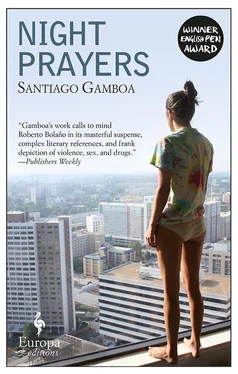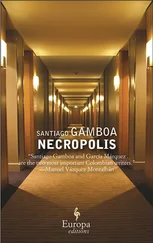Two days later he replied saying that the name was there, but that they had no recent news of her. Why had they told Manuel she wasn’t registered with them? Maybe they’d been negligent, maybe the page hadn’t been very clear, or they’d simply acted in haste. Things done and said on the telephone are usually vague and imprecise, but how happy he would have been if they’d told him she was on their list.
The consul went on to say that Juana Manrique had given the address of a hotel, and that she had never voted in elections. He added something that I already knew: many leave the country without bothering to inform the consulate, the fact that someone is registered only means they were here once.
All of us were here once.
The consul was a religious person and ended his letter with a biblical allusion: on his list, he said, he didn’t know who was who, or what they did, which was why we would have to wait for the last day, when the Lord — he wrote it with a capital letter — came to separate the good from the bad. I didn’t have a Bible to hand to check what exactly he was talking about, but I was impressed all the same.
I flew to Tokyo soon afterwards, feeling nervous and excited.
What a strange city. My first, fairly rapid, observation led me to the conclusion that it was in the future, but then, thinking of Delhi and Bogotá, I realized that Tokyo is indeed the future, but only of Tokyo.
Tokyo is the future of Tokyo.
On this kind of trip, I’m always in the habit of referring to literature, to see what other people have written and said. Books and poetry are my Lonely Planet. And so I found, for example, that when Marguerite Yourcenar arrived in Tokyo in 1982 she exclaimed: “My God, eleven million robots!” She couldn’t get past that caricature, that paternalistic image that Europeans have of Asia. Not the case with Richard Brautigan, who married a Japanese woman in 1978. Americans are (or were) better travelers, demanding nothing of the places they visit. The marriage lasted only two years, but Brautigan remained in Tokyo, until his life, as his biographers say, “dissolved into alcohol and insomnia.” An interesting dissolution. Brautigan liked haiku and wrote this:
I like this taxi driver,
racing through the dark streets of Tokyo
as if life had no meaning.
I feel the same way.
We were being put up at the Sheraton Miyako on Shirokanedai in Minato, near the residence of the Colombian embassy, a luxury hotel with a beautifully tended inner garden opposite the lobby, reminding one that gardening is one of the Japanese fine arts (through it you can learn about Buddhism).
The dinner to welcome us to the symposium was at seven-thirty in the evening, so I had time to get organized without having to rush. I went to a 7-11 to see what I could find of interest, and ended up buying a liter of gin for the same price as a little bottle at the hotel. I asked room service for some ice and soon afterwards they sent up the most beautiful ice bucket I had ever seen in my life, with cubes that looked as if they’d only just been invented, as if they came straight from Plato’s Cave: aseptic, perfect, symmetrical. I suppose these things happen to everybody on their first visit to Japan.
At the dinner, after the formal greetings and expressions of gratitude, Enrique Serrano gave us a wide-ranging talk about Japanese culture, including historical, political, and economic aspects, and then, at about eleven, we were driven back to the hotel. Once in my room, I asked for a little more of that Swarovski ice and sat down to read a novel by Kenzaburo Oe, but found I couldn’t concentrate. I was extremely anxious about the chances of finding Juana and, of course, taking her to Bangkok.
The consul was waiting for me the following day.
The branches of the trees swayed in the wind, and the cold of winter was already in the air. A leaf dancing, an empty sidewalk, the dark cherry trees, the drizzle. Everything seemed made for a haiku.
The office was next to the residence, a big, impressive building surrounded by gardens that evoked the Japanese forests with their spirits and demons.
I told the consul who Juana Manrique was and why I was looking for her. He ordered two cups of coffee, we sat down by the window, and he pointed to the clouds. They move very fast here, had I noticed? No, I said. He was a friendly man, a bit out of the ordinary. He was interested in the story of what had happened to Manuel Manrique in Bangkok, and wanted to know if we had hired a lawyer. In his experience as a jurist, he thought that the most desirable thing would be to transfer the sentence to Colombia. The problem, once again, was not having an embassy. Countries look at these things with a lot of suspicion. Then he told me his own suspicion, or rather his hypothesis: Juana Manrique hadn’t come to Tokyo to study Japanese, as she had stated when she registered with the consulate, but to work as a prostitute; that was why they’d had no further news of her. I agreed, omitting to tell him that I already knew that.
“They get them here through deception,” the consul went on, “although to be honest, the deception has more to do with some of the details than the basics, if I can put it that way. They know they’re going to work as prostitutes, but they think they’ll be high-class escorts, working a few times a week, and above all, that they’ll be able to decide the terms. That’s what they’re promised. But when they get here, things are very different. They’re forced to work on the street, which makes them very frustrated. If they show promise and gain the trust of their bosses, they get promoted to working in hotels. The trade is controlled by the Japanese Mafia. The girls are known as ‘talents’; they work in places called theater bars, where they have to do striptease, pose for pornographic photographs, and have sex with men who win draws for them. The rest of the time they’re kept in residences and aren’t allowed out, not even one day a week. Their clothes are taken away from them, they live in the nude.”
The consul was well-informed. He said there were about a thousand Colombian women doing this. That was a rough calculation, because they weren’t usually allowed to register with the consulate (the case of Juana Manrique was unusual, which suggested she was at a higher level). Naturally, their passports were taken away.
“It’s a kind of slavery,” he went on. “They’re considered to have incurred a debt, but it’s one they never stop paying off and that keeps growing at the discretion of the lender, which in this case is the Mafia. It’s like Rivera’s The Vortex but in Japan, have you read The Vortex ?”
“Yes,” I said. “It’s very good. And where do you think she might be?”
“Hard to say. A lot of girls go to Yokohama or Kyoto. Here in Tokyo, there are different zones. It’s like looking for a needle in a haystack, but it isn’t impossible.”
I made a copy of the registration document for the sake of Juana’s photograph and went back to my hotel. Before I left, the consul took me by the arm and said, almost conspiratorially, look at the color of the leaves on the trees, try to spot the differences, it’s a real source of peace. I told him I would and thanked him. When I’d turned the corner, I pulled out the document and took a good look at the photograph: Juana had very dark, very expressive eyes, and a tense smile.
My God, that was her.
The first thing to do if you’re looking for someone is to use the Internet. I typed in Juana Manrique and got 11,600 results. It’s a very common name, like her brother’s. Adding the word Japan reduced it to 190, but none of them were her. I looked at the kind of people they were but that wasn’t any help either. I tried Juana Manrique + Japan + sexual services , and the figure shot up again: 9,345 results. Then I tried something a little more specialized: Colombian women + sex + Tokyo . Again, an absurd figure: 560,689. Then I thought of another angle and wrote Tokyo + escorts . The first site I clicked on had a telephone number, which I called. Much to my surprise, there was an answering machine and multiple options, with questions I didn’t know how to answer. I replied at random and carried on until I got to an operator. Looking for company in Tokyo? Yes, I said, making it clear that I wanted a Colombian girl.
Читать дальше












